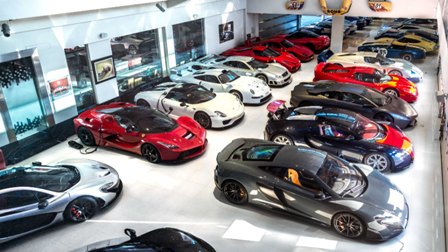MANNY PHILIPSON
The persistent decline in sales volume of new vehicles year-on-year could prompt fresh round of rationalization and unprecedented upsurge in the price of new automobiles, stakeholders warned.
They are worried that the combined new vehicle deliveries have continued to plunge, from more than 50, 000 units sold in 2014 to less than 10,000 units at the close of business in 2017.
“Unless urgent and proactive steps are taken to stem the tide, most dealerships and vehicle assembly plants could begin to close their shops and suspend production activities.”
Over a dozen dealerships including after-sales shops,representing various manufacturers have either shut down or swap business lines.
Those in operations are merely contending with the diminutive margin from their trading activities.
It is, however, doubtful if sales would improve anytime soon, given the unimpressive purchasing power of the populace.
Prices of new vehicles are also not expected to fall, as exchange rates with some world major currencies are not anything to cheer. The dollar, for instance still exchanges for NGN365 at the parallel market.
Hypothetical reports may have cleared Nigeria from recession, but there are indications that the automobile sub-sector is still gasping for breath.
Given the sales statistics of the Q3 of 2017, the automobile market could be said to be precariously hemorrhaging, owing largely, to government neglect, policy summersaults and undue taxation that have left the industry worse-off year-on-year, a stakeholder affirmed.
He said: At the twilight of 2016, stakeholders in the industry were enthusiastically hopeful that 2017 would transcend the previous year in performance index, but these prospects turned out to be mere wishful thinking, as the year ended, leaving much to be desired.
“From a combined sales of 50, 000 new vehicles (using 2014 statistics), sales plummeted to 14, 500 units in 2016 and by the Q3 of 2017, sales have glided downwards the curve to less than 10, 000 units, the worst result in five years.”
The restriction of vehicle imports through the land borders in December 2016 was at first expected to boost new vehicle sales, but sudden hike in tariffs from 22.5 percent to 70 percent coupled with paucity of FX (FOREX) deprived new vehicle marketers of the resultant aspirations.
Local vehicle manufacturers have similarly been devastated as they couldn’t access FOREX to import knocked down components to get their lines running.Some of them eventually resorted to laying-off workers to save cost, regardless of the consequences.
The result however is a total decline in the combined outputs of the plants with a conforming descent in imports of fully-built-up units and subsequent upsurge in showroom price of new vehicles – a scenario that has incapacitated patronage.
A compact sedan such as Toyota Corolla for instance now sells for between N20m and N22m as against N12m or N14m two years ago, and so it is with the likes of Nissan Sentra, which though is assembled locally, sells for as much as between N12m or N14m.
Prices of commercial vehicles such as the 17-seater commuter vans commonly used for transporting people over long distances have similarly witnessed sporadic increase in unit price.
Transporters, to this end, can’t re-fleet their pool of buses and now resort to overstretching their vehicles so much so that they become susceptible to protracted downtime or accidents.
Dealerships have blamed hike in price of the various brands of vehicles on paucity of FOREX, hike in tariffs and uncertainty in government policies.
“Tariffs, for instance, suddenly surged form 22 percent to 70 percent (for passenger cars) and from 10 percent to 35 percent (for commercial vehicles) at the implementation of the National Automotive Industry Development Plan (NAIDP) in late 2014, stakeholders lamented.
Although there hasn’t been a corresponding rise in levy paid on used vehicles,(which is 35 percent duty),franchised marketers and vehicle assemblers have disputed this disparity as unhealthy for business.
Government, as it is, wouldn’t want the National Automotive Industry Development Plan (NAIDP) to fail, having painstakingly invited various FDIs (foreign direct investments) to stake their hard earned funds in establishing assembly plants in Nigeria.
The government is, therefore, expected to encourage the stakeholders by creating an accessible pool of FOREX; partner with financial institutions both home and abroad to fund and support vehicle acquisition schemes, grant long and sustainable tax holidays and essentially, firm up the Naira against major world currencies.
“Otherwise of what relevance is Nigeria’s alliance to the Paris Agreement which it signed in Marrakesh in 2016?” a stakeholder rhetorically asked, claiming that 80-90 percent automobile environmental impact is due to fuel consumption and emissions of air pollution and greenhouse gases that climate scientists say drives global warming.
The Paris Agreement’s central aim is to strengthen the global response to the threat of climate change by keeping global temperature rise this century well below two degrees Celsius above pre-industrial levels and to pursue efforts to limit the temperature increase even further to 1.5 degrees Celsius.
The agreement also aims to strengthen the ability of countries to deal with the impacts of climate change. To reach these ambitious goals, appropriate financial flows, a new technology framework and an enhanced capacity building framework will be put in place, thus supporting action by developing countries and the most vulnerable countries, in line with their own national objectives.
MANNY PHILLIPSON is principal partner at Media Advocate Limited (a marketing communications and automotive resource enterprise.)




